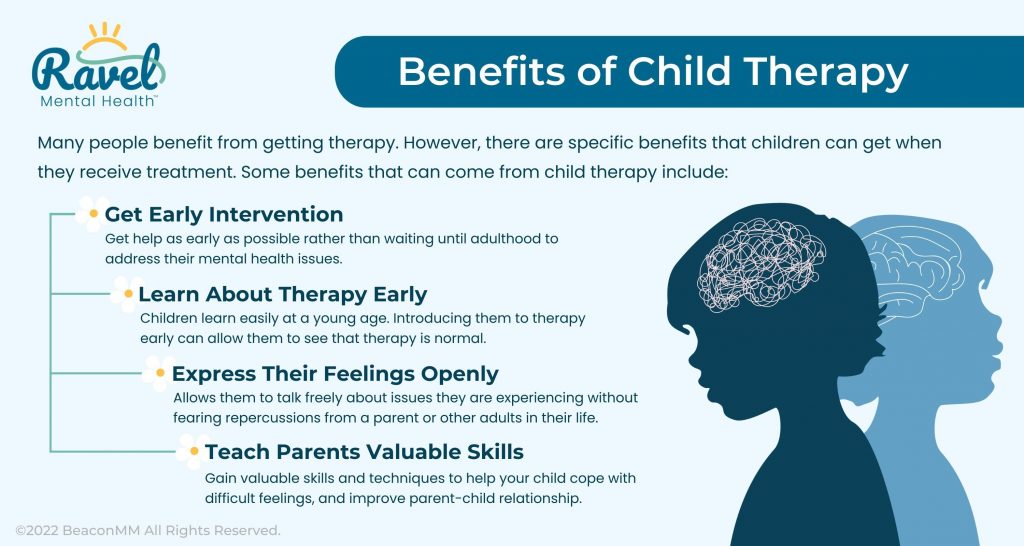Therapy can be beneficial for many people. However, many people don’t seek treatment until they’re already in their 20’s. This can sometimes make it harder to change habits or prevent their mental health condition from affecting their lives.
Some people may only consider taking their children to therapy if it’s through a family therapist or after a traumatic experience. But utilizing therapy at a younger age can help give them the tools necessary to emotionally process their feelings and take a moment to reflect before taking action.
You may be asking yourself, “does my child need therapy?” And while every child may not need it, there are many benefits people can get from going to therapy. Here’s a guide on what parents should know about when to take their child to therapy and its benefits.
Are you interested in finding a child therapist in your area? Sign up for Ravel Mental Health today to find a therapist!
Why Would Your Child Need Therapy?
Kids and teens need therapy when they have problems coping alone. Although you may be an outlet for them to talk to, sometimes they can feel uncomfortable talking openly about their problems, and talking to someone outside their daily life can make them feel freer to talk about what they’re going through.
They may need help when those problems affect what they do, feel, or act. If things don’t get better on their own, some kids can benefit from getting therapy, so they have the right tools to change what they want to change.
On occasion, the entire family may need support while learning how to communicate, learn, or create boundaries with one another. Seeing a therapist can give everyone the proper tools to implement these into the family with professional and gradual help.
Many children may need therapy if they’re going through a tough time that they may not know how to cope emotionally. Some instances can include:
- Family problems
- School problems
- Bullying
- Health problems
Kids can also benefit from getting help working through their feelings, such as:
- Sadness
- Anger
- Stress and worry
- Low self-esteem
- Grief
Therapy can also be largely beneficial for kids or teens struggling with mental health conditions. Almost half of all mental health conditions begin by the age of 14 and 75% by the age of 24, making it crucial for kids to seek help early before they can negatively impact their lives. Some mental health conditions that can be treated through therapy consist of:
- ADHD
- Depression
- OCD and anxiety
- Eating disorders
- Self-injury
- Disruptive behavior disorders
- Trauma-related disorders
No matter the problem, if your child is struggling somehow, going to therapy can help them cope with their feelings and give them the tools to deal with them healthily.
What Are Signs That Your Child Should Go to Therapy?
Most kids or teens won’t openly come to you and ask to go to therapy. They may not know that an option for help is available or may have heard negatively stigmatized opinions about going to therapy. However, if you let them know that this is an available resource for them, they may be more likely to ask for help when they need it.
It can be challenging to know if you should take your child to therapy if they’re not open to the idea. However, if you’ve noticed signs that they could benefit from going to therapy to mitigate events such as outbursts, then it’s time to consider taking them to therapy. You should maintain an open line of communication where you’ll have them go to therapy, and if they’re no longer wanting to go, you can reevaluate. You can also listen to the professional advice of the therapist and make your decision from there.
Some signs that could help you recognize when it’s time to take your child to therapy consist of:
- Struggling in many areas of their life, such as poor school performance, having behavioral problems at home, or seeming disconnected from friends
- Having significant changes in behavior, including appetite, sleep, or irritability
- Talking in a self-deprecating way, suicidal tendencies, or self-harm
- Having excessive worry about regular activities, the future, death, etc.
- Experiencing panic attacks
- Feeling unconfident, struggling to make friends, or very socially anxious
- Displaying harmful, impulsive behavior
- Saying they need help
If your child says they’re worried about their mental health and directly asks for help, get them the help they are asking for, and don’t doubt that their feelings aren’t “serious enough” to require therapy. Some kids may reach out for help, but many don’t say anything because they’re unsure if it will help them or how someone may react to them going to therapy. Offering an available resource for them to get help will mitigate the chances of something going wrong.
Do you want to find a therapist for your child? Sign up for Ravel Mental Health today!
What Are the Benefits of Child Therapy?
Many people benefit from getting therapy. However, there are specific benefits that children can get when they get treatment. Some benefits that can come from child therapy can include the following.
Get Early Intervention
One of the best benefits of offering therapy to your child is getting them help as early as possible rather than waiting until their adults to address their mental health issues. Going to therapy can provide children with the tools to better cope with issues, create stronger relationships, and build self-confidence. It allows your child to be prepared with healthy coping mechanisms that will improve their lives when they run into problems or have difficulties with their mental health.
Learn About Therapy Early
Children learn easily at a young age. Introducing them to therapy early can allow them to see that therapy is normal and okay, so they won’t see therapy as taboo when they run into issues as an adult. It can feel like going to the doctor or the dentist — letting them know that taking care of their mental health is just as important as taking care of their body.
Express Their Feelings Openly
Children and teens may struggle to express their emotions. Having a trusted person like a therapist can allow them to talk freely about the issues they are experiencing without fearing repercussions from a parent or other adults in their life. Going to therapy will allow them to tell someone about what they’re feeling and get the proper tools to deal with it healthily.
Teach Parents Valuable Skills
A child therapist can often teach parents valuable skills that will help improve the parent-child relationship. You can gain valuable skills and techniques to help your child cope with difficult feelings, heal from trauma, address mental health concerns, or handle behavioral issues. Using these tools will allow you to communicate better with your children and create a safe space for discussions to happen.
How to Find a Child Therapist
There are probably many therapists in your area. However, finding one specializing in treating children and families can be challenging but more beneficial for effectively helping your child.
Ravel Mental Health is an online platform that allows you to connect with therapists near you. You can search on the platform using the filters to find the specific type of therapist you’d like to connect with.
You’ll also be able to schedule appointments with the therapist through the platform and avoid playing phone tag. This is an easy way for you to connect with the right therapist for your child and get treatments in a schedule that works for you.
If you’ve noticed signs that therapy might be right for your child, don’t wait and start the conversation with them. When you’re ready, you can use Ravel Mental Health to cut down on research time and connect with a therapist within a few clicks.
Are you ready to help your child through their tough time? Sign up for Ravel Mental Health to find the right therapist for your family.

